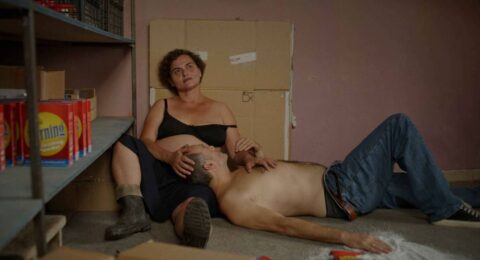With just their third film, Elene Naveriani is already a director who knows what they want to do and goes ahead and does it. I Am Truly a Drop of Sun on Earth (2017) and Wet Sand (2021) showed immense promise. Directors’ Fortnight entry Blackbird Blackbird Blackberry (2023), adapted from the novel by Tamta Melashvili, delivers on it with a powerful slow-burn drama that has an air of both spontaneity and inevitability; rich with ineffable qualities that straddle the line between social realism and an air of genuine cinema magic.
Etero (Eka Chavleishvili) owns a shop that sells cleaning and cosmetic products. She’s 48 years old. She’s single. She likes to keep to herself. But when she is collecting blackberries by the edge of a ravine, she spots a gorgeous blackbird. Distracted, she slips and nearly falls to her demise (in perhaps the only clunky sequence in the movie). In the first of many magical realist garnishes, she sees herself lying dead at the bottom, surrounded by various rubberneckers. She sees how quickly life can change. Perhaps she should do something about it.
In Naveriani’s films, the plot springs slowly out of the carefully planned world they create, like a small, winding stream that turns into a river. While there are incidents throughout the movie, including an excellent opening sequence before the title drop, there is a careful focus on atmosphere, on using unusual lighting sequences — bold blues and greens — and lived-in production design. Lingering shots of local life, the various products in Etero’s shop or the way she devours a cake, all feel pregnant with hidden, tantalising meaning.
And few filmmakers utilise the power of the sound mix quite like Naveriani. Slow cinema’s secret weapon, the way a film sounds is just as important as how it looks, especially when immersing the viewer into a certain atmosphere. Sound designer Phillipe Ciompi inserts birdsong, nearby dogs barking, music from faraway radios and the woosh of pleasant rivers into otherwise domestic, interior scenes, imbuing almost every frame with a certain intangible quality. I loved how non-normative the use is as well, as if subtly suggesting Etero’s inner desire for peace and tranquillity.
Constantly listening to various old-timey French chansons and Georgian folk hits, actress Chavleishvili has an excellent way of being to express with her physical presence what seems impossible with words. Closed off to the world around her, she convinces her female friends — all married, in various degrees of happiness — that she is perfectly fine with her shop and saving up for a relaxed retirement, all in the same village that she grew up in. Tellingly the younger women look up to her, a model of non-conformity in an otherwise patriarchal place.
But there is still an inner yearning, somewhat satisfied by the simple, yet endearing distributor Murman (Teminko Chinchinadze). As their relationship blooms, the film slowly opens up, finding a sentimental heart through poetry (kudos to the translation work courtesy of Mia Okraushvili and Alexander Shervashidze!), sexuality and a genuine sense of tenderness. Soon Etero finds the old certainties draining away, metaphors of menopause and bodily change seeping throughout. With multiple layers of meaning deserving of a rewatch, this is a fine piece of art from one of the most exciting young directors working today.
Read our interview unpacking the themes of the movie with Elene Naveriani.
Redmond is the editor-in-chief of Journey Into Cinema.
